2023届高三英语虚拟语气课件(35张PPT)
文档属性
| 名称 | 2023届高三英语虚拟语气课件(35张PPT) |

|
|
| 格式 | pptx | ||
| 文件大小 | 15.9MB | ||
| 资源类型 | 教案 | ||
| 版本资源 | 通用版 | ||
| 科目 | 英语 | ||
| 更新时间 | 2022-10-31 00:00:00 | ||
图片预览

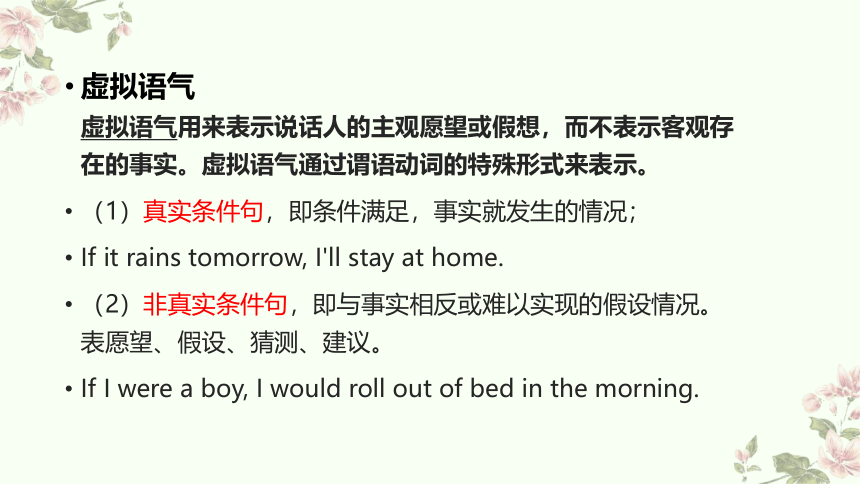
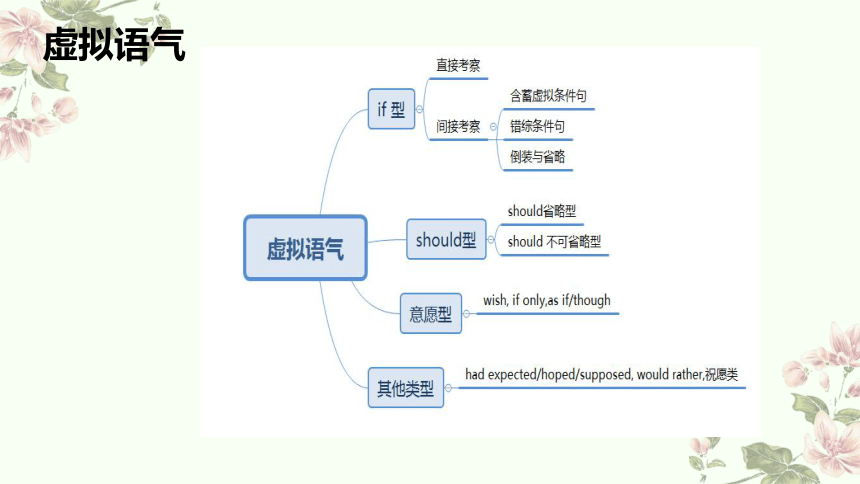

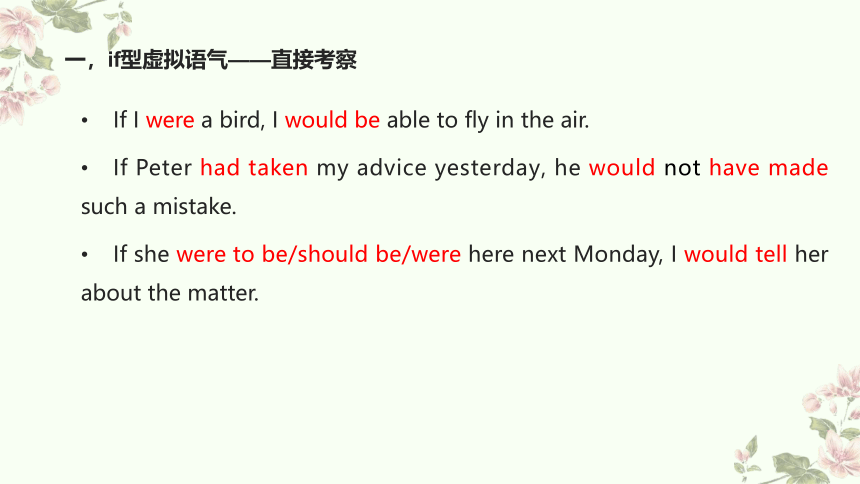
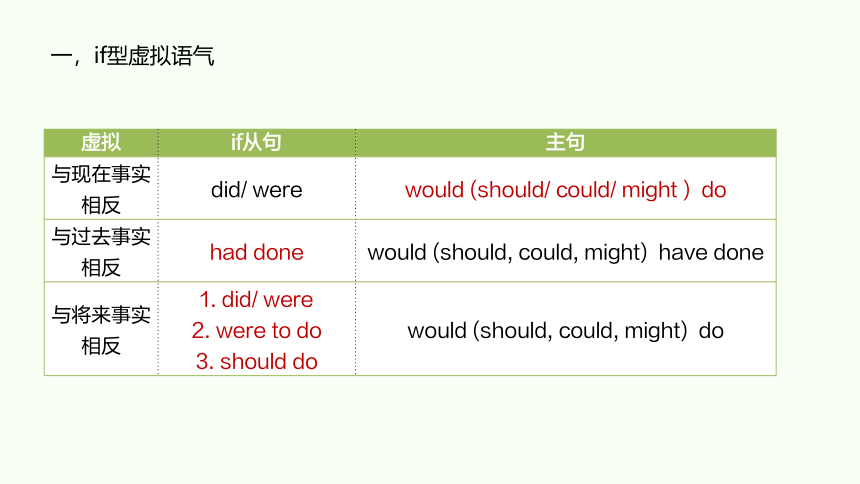
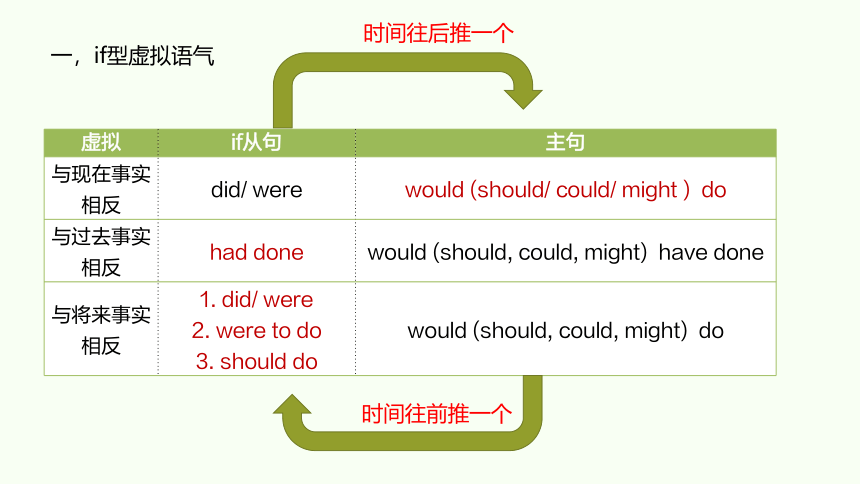
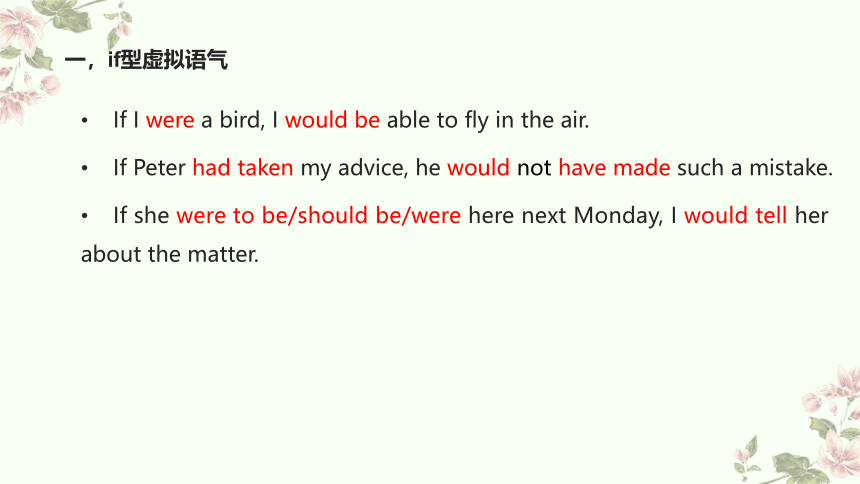
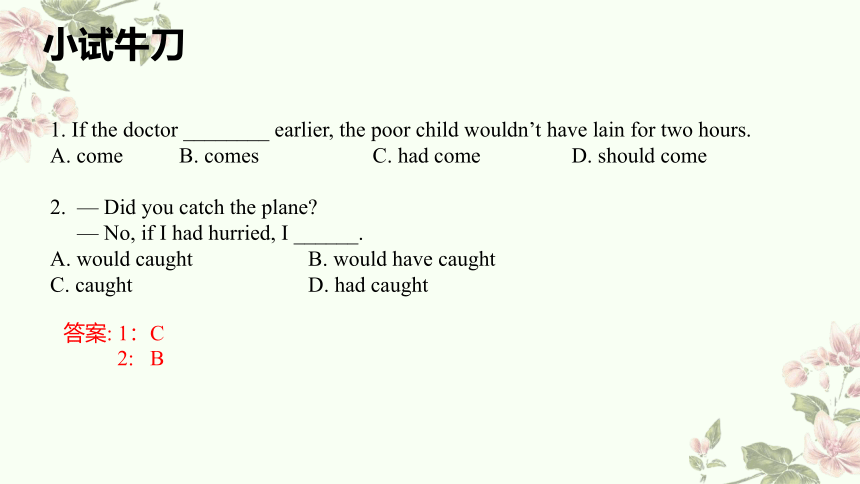
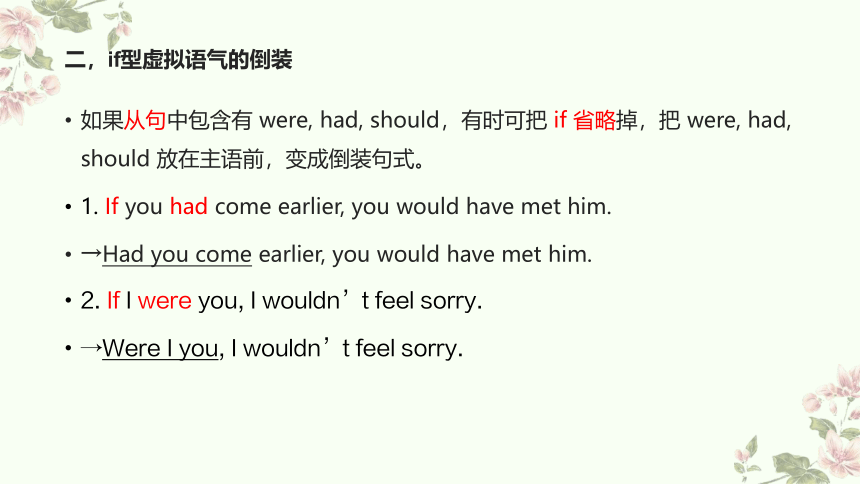
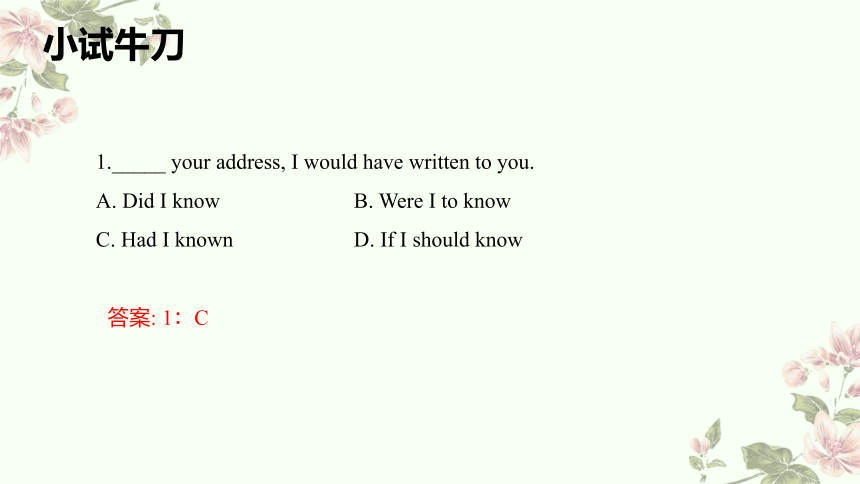
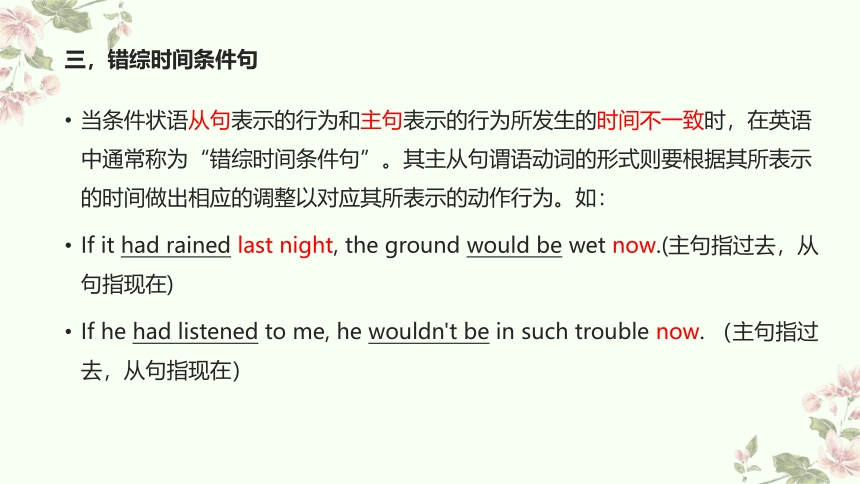
文档简介
(共35张PPT)
虚拟语气
虚拟语气
虚拟语气用来表示说话人的主观愿望或假想,而不表示客观存在的事实。虚拟语气通过谓语动词的特殊形式来表示。
(1)真实条件句,即条件满足,事实就发生的情况;
If it rains tomorrow, I'll stay at home.
(2)非真实条件句,即与事实相反或难以实现的假设情况。表愿望、假设、猜测、建议。
If I were a boy, I would roll out of bed in the morning.
虚拟语气
一、if型虚拟语气
一,if型虚拟语气——直接考察
If I were a bird, I would be able to fly in the air.
If Peter had taken my advice yesterday, he would not have made such a mistake.
If she were to be/should be/were here next Monday, I would tell her about the matter.
虚拟 if从句 主句
与现在事实相反 did/ were would (should/ could/ might ) do
与过去事实相反 had done would (should, could, might) have done
与将来事实相反 1. did/ were 2. were to do 3. should do would (should, could, might) do
一,if型虚拟语气
虚拟 if从句 主句
与现在事实相反 did/ were would (should/ could/ might ) do
与过去事实相反 had done would (should, could, might) have done
与将来事实相反 1. did/ were 2. were to do 3. should do would (should, could, might) do
一,if型虚拟语气
时间往后推一个
时间往前推一个
一,if型虚拟语气
If I were a bird, I would be able to fly in the air.
If Peter had taken my advice, he would not have made such a mistake.
If she were to be/should be/were here next Monday, I would tell her about the matter.
小试牛刀
1. If the doctor ________ earlier, the poor child wouldn’t have lain for two hours.
A. come B. comes C. had come D. should come
2. — Did you catch the plane
— No, if I had hurried, I ______.
A. would caught B. would have caught
C. caught D. had caught
答案: 1:C
2: B
二,if型虚拟语气的倒装
如果从句中包含有 were, had, should,有时可把 if 省略掉,把 were, had, should 放在主语前,变成倒装句式。
1. If you had come earlier, you would have met him.
→Had you come earlier, you would have met him.
2. If I were you, I wouldn’t feel sorry.
→Were I you, I wouldn’t feel sorry.
小试牛刀
1._____ your address, I would have written to you.
A. Did I know B. Were I to know
C. Had I known D. If I should know
答案: 1:C
三,错综时间条件句
当条件状语从句表示的行为和主句表示的行为所发生的时间不一致时,在英语中通常称为“错综时间条件句”。其主从句谓语动词的形式则要根据其所表示的时间做出相应的调整以对应其所表示的动作行为。如:
If it had rained last night, the ground would be wet now.(主句指过去,从句指现在)
If he had listened to me, he wouldn't be in such trouble now. (主句指过去,从句指现在)
小试牛刀
1. If you had taken your medicine yesterday, you ________ quite all right now.
A. will be
B. are
C. would have been
D. would be
2. If they had informed us, we _____ here now.
A. would not come
B. would have come
C. will not come
D. may not come
答案:1:D
2:A
四. 含蓄虚拟条件句
指将条件从句隐藏在上下文一定的短语中的一类条件句;利用某些词(名词,形容词,连词),短语(分词短语,不定式短语或介词短语等)或并列从句来表示;有时还可以通过上下文和句子内在的逻辑关系来暗示。这些手段都起着虚拟条件从句的作用。
But for their help, we could not have finished the work on time.
要不是他们的帮助,我们就不可能完成那项工作(表过去)。
Without electricity, there would be no modern industry.
没有电,就没有现代工业。(表现在)
常见含蓄虚拟词: otherwise / without / thanks to / but for / or+名词结构(代替if条件句) 与现在事实相反 主句:主语+should/would/could/might+do
与过去事实相反 主句:主语+should/would/could/might+ have+done
与将来事实相反 主句:主语+should/would/could/might +do
Without air, there would be no living things.
没有空气,就没有生物。(对现在的虚拟)
But for your help, I couldn’t have achieved anything.
要不是你的帮助,我不可能取得任何成就。(对过去的虚拟)
I was ill that day. Otherwise, I would have taken part in the sports meeting.
我那天生病了。否则我就参加运动会了。(对过去的虚拟)
Thanks to the man’s timely rescue, the child would have been drowned.
多亏了这位男士的及时救援,否则孩子就淹死了。(对过去的虚拟)
小试牛刀
1. But for your help, I ________.
A. can have failed again B. may have failed again
C. will be failed again D. would have failed again
2. You didn’t go to the party yesterday, or I ______ you.
A. would see B. could see C. might have seen D. might see
答案:1:D
2: C
二、should型虚拟语气
1. suggest, require, order, etc. +宾语从句
在一些表示建议、愿望、要求、请求、劝告、意志、欲望、命令、安排、决定等的动词的宾语从句中,要用虚拟语气。
这类动词有:ask,require,request,demand,pray,insist,desire,maintain,propose,suggest,move,urge,advise,recommend,command,order,arrange,decide 等。如:
She demanded (that) the paper (should) be rewritten.
I suggest (that) he (should) get there as soon as possible.
一. should型虚拟语气——should可以省略(表坚决要命)
一. should型虚拟语气——should可以省略(表坚决要命)
2. it is desirable, required, etc. +主语从句
在it is +表示要求、建议、必要、命令等意思的形容词或分词+主语从句的结构中。
这类形容词和分词有:advised, advisable, better, desired, desirable, demanded, essential, important, natural, necessary, ordered, proposed, possible, probable, preferable, recommended, required, suggested, strange, urgent, strange, incredible等;这个表语结构也可以是it is a pity, it is a wonder, it is a shame 等。例如:
It’s necessary (that) we (should) start to do the work right away.
It’s urgent we (should) send for a doctor at once.
It is a pity that she (should) call black white.
3. 用于表语从句或同位语从句中的虚拟语气
在一些表示愿望、建议、要求、命令等意义的名词后的表语从句或同位语从句后,谓语动词要用虚拟语气。
这类名词有:advice,decision,idea,order,plan,proposal,recommendation,suggestion,opinion,requirement,direction,policy等。
例如:
My opinion is that we (should) review their proposal right now.
He made the request that the problem (should) be settled at once.
记忆口诀:坚(建议/坚持)决(决定)要(要求)命(命令)
一. should型虚拟语气——should可以省略(表坚决要命)
小试牛刀
1. It was suggested that everyone _____ a mask in public places after the outbreak of COVID-19. (2021)
A.shall wear B.will wear C.wear D.wears
2. The professor demanded that all the essays ______ to him by Jan. 10th.
A. hand in B. be handed in C. should hand in D. were handed in
3. When giving a large sum of money to this school, Bob insisted that his name _____ secret. (2014)
A. is keeping B. was keeping C. be kept D. is kept
答案:1:C
2:B
3:C
lest/ for fear (that)/ in case 引导的状语从句,表示担心、忧虑,从句用should加动词原形,should可以省略。例如:
I’m telling you this lest you (should) doubt my sincerity.
我告诉你这件事,以免你怀疑我的诚意。
Julia had to go on a diet for fear that she (should) lose her job as a model.
朱莉娅不得不节食,以防失去模特的工作
二. should型虚拟语气——should可以省略(表”以防“)
小试牛刀
1.The student checked his writing carefully lest it _____ some spelling mistakes.
A. had
B. has
C. will have
D. should have
答案:D
It’s (high/ about) time +从句
从句谓语
表示是应该做某事的时候了 did或should + do (should 不可省)
例如:
It’s high time that we took/should take effective measures.
是时候采取一些有效措施了。
三. should型虚拟语气——should不可以省略
小试牛刀
1.It’s high time we ________ some actions to prevent pollution.
A. take
B. took
C. taking
D. is taking
答案:B
三、意愿型虚拟语气
意愿型虚拟语气:wish/if only/ as if/ as though
1. wish/if only/ as if/ as though +从句:
宾语从句谓语
与现在愿望相反 did(be动词一般用were)
与过去愿望相反 had done
与将来事实相反的假设 would/could+ do
例如:
I wished I hadn’t spent so much money yesterday.
我多么希望我昨天没有花这么多钱。
例如:He talked as if he had been there many times.
他说起话来好像他去过那里很多次。
If only I were a boy.
要是我是男生就好了。
If only he would come with us tomorrow.
要是他明天和我们一起来就好了。
意愿型虚拟语气:wish/if only/ as if/ as though
小试牛刀
1. If only I _______ what you want now!
A. known B. knew C. had known D. have known
2. John is over fifty, but he looks as if he ______ only in his thirties.
A. is B. were C. will be D. has been
答案:1:B
2:B
四、其他类型虚拟语气
其他类虚拟语气
would rather或had rather或would sooner+宾语从句:表“宁愿......”
从句谓语
与现在事实相反的愿望
did(be动词一般用were)
与将来事实相反的愿望 与过去事实相反的假设 had done
如:
We would rather he came tomorrow.
I’d rather you had seen the film yesterday.
小试牛刀
1. I would rather you _____ next Saturday.
A. come
B. came
C. had come
D. will come
答案:B
其他类虚拟语气
had hoped/ expected/ supposed that… 后面的从句要用虚拟语气,通常谓语用would + 动词原形,表示过去未能实现的愿望。例如:
He had hoped that he would do better in his work.
他后悔没有把工作做得更好
表示祝愿的话:May +名词+V原形
例如:
May our longstanding friendship last forever!
祝我们友谊长存!
Thank you!
虚拟语气
虚拟语气
虚拟语气用来表示说话人的主观愿望或假想,而不表示客观存在的事实。虚拟语气通过谓语动词的特殊形式来表示。
(1)真实条件句,即条件满足,事实就发生的情况;
If it rains tomorrow, I'll stay at home.
(2)非真实条件句,即与事实相反或难以实现的假设情况。表愿望、假设、猜测、建议。
If I were a boy, I would roll out of bed in the morning.
虚拟语气
一、if型虚拟语气
一,if型虚拟语气——直接考察
If I were a bird, I would be able to fly in the air.
If Peter had taken my advice yesterday, he would not have made such a mistake.
If she were to be/should be/were here next Monday, I would tell her about the matter.
虚拟 if从句 主句
与现在事实相反 did/ were would (should/ could/ might ) do
与过去事实相反 had done would (should, could, might) have done
与将来事实相反 1. did/ were 2. were to do 3. should do would (should, could, might) do
一,if型虚拟语气
虚拟 if从句 主句
与现在事实相反 did/ were would (should/ could/ might ) do
与过去事实相反 had done would (should, could, might) have done
与将来事实相反 1. did/ were 2. were to do 3. should do would (should, could, might) do
一,if型虚拟语气
时间往后推一个
时间往前推一个
一,if型虚拟语气
If I were a bird, I would be able to fly in the air.
If Peter had taken my advice, he would not have made such a mistake.
If she were to be/should be/were here next Monday, I would tell her about the matter.
小试牛刀
1. If the doctor ________ earlier, the poor child wouldn’t have lain for two hours.
A. come B. comes C. had come D. should come
2. — Did you catch the plane
— No, if I had hurried, I ______.
A. would caught B. would have caught
C. caught D. had caught
答案: 1:C
2: B
二,if型虚拟语气的倒装
如果从句中包含有 were, had, should,有时可把 if 省略掉,把 were, had, should 放在主语前,变成倒装句式。
1. If you had come earlier, you would have met him.
→Had you come earlier, you would have met him.
2. If I were you, I wouldn’t feel sorry.
→Were I you, I wouldn’t feel sorry.
小试牛刀
1._____ your address, I would have written to you.
A. Did I know B. Were I to know
C. Had I known D. If I should know
答案: 1:C
三,错综时间条件句
当条件状语从句表示的行为和主句表示的行为所发生的时间不一致时,在英语中通常称为“错综时间条件句”。其主从句谓语动词的形式则要根据其所表示的时间做出相应的调整以对应其所表示的动作行为。如:
If it had rained last night, the ground would be wet now.(主句指过去,从句指现在)
If he had listened to me, he wouldn't be in such trouble now. (主句指过去,从句指现在)
小试牛刀
1. If you had taken your medicine yesterday, you ________ quite all right now.
A. will be
B. are
C. would have been
D. would be
2. If they had informed us, we _____ here now.
A. would not come
B. would have come
C. will not come
D. may not come
答案:1:D
2:A
四. 含蓄虚拟条件句
指将条件从句隐藏在上下文一定的短语中的一类条件句;利用某些词(名词,形容词,连词),短语(分词短语,不定式短语或介词短语等)或并列从句来表示;有时还可以通过上下文和句子内在的逻辑关系来暗示。这些手段都起着虚拟条件从句的作用。
But for their help, we could not have finished the work on time.
要不是他们的帮助,我们就不可能完成那项工作(表过去)。
Without electricity, there would be no modern industry.
没有电,就没有现代工业。(表现在)
常见含蓄虚拟词: otherwise / without / thanks to / but for / or+名词结构(代替if条件句) 与现在事实相反 主句:主语+should/would/could/might+do
与过去事实相反 主句:主语+should/would/could/might+ have+done
与将来事实相反 主句:主语+should/would/could/might +do
Without air, there would be no living things.
没有空气,就没有生物。(对现在的虚拟)
But for your help, I couldn’t have achieved anything.
要不是你的帮助,我不可能取得任何成就。(对过去的虚拟)
I was ill that day. Otherwise, I would have taken part in the sports meeting.
我那天生病了。否则我就参加运动会了。(对过去的虚拟)
Thanks to the man’s timely rescue, the child would have been drowned.
多亏了这位男士的及时救援,否则孩子就淹死了。(对过去的虚拟)
小试牛刀
1. But for your help, I ________.
A. can have failed again B. may have failed again
C. will be failed again D. would have failed again
2. You didn’t go to the party yesterday, or I ______ you.
A. would see B. could see C. might have seen D. might see
答案:1:D
2: C
二、should型虚拟语气
1. suggest, require, order, etc. +宾语从句
在一些表示建议、愿望、要求、请求、劝告、意志、欲望、命令、安排、决定等的动词的宾语从句中,要用虚拟语气。
这类动词有:ask,require,request,demand,pray,insist,desire,maintain,propose,suggest,move,urge,advise,recommend,command,order,arrange,decide 等。如:
She demanded (that) the paper (should) be rewritten.
I suggest (that) he (should) get there as soon as possible.
一. should型虚拟语气——should可以省略(表坚决要命)
一. should型虚拟语气——should可以省略(表坚决要命)
2. it is desirable, required, etc. +主语从句
在it is +表示要求、建议、必要、命令等意思的形容词或分词+主语从句的结构中。
这类形容词和分词有:advised, advisable, better, desired, desirable, demanded, essential, important, natural, necessary, ordered, proposed, possible, probable, preferable, recommended, required, suggested, strange, urgent, strange, incredible等;这个表语结构也可以是it is a pity, it is a wonder, it is a shame 等。例如:
It’s necessary (that) we (should) start to do the work right away.
It’s urgent we (should) send for a doctor at once.
It is a pity that she (should) call black white.
3. 用于表语从句或同位语从句中的虚拟语气
在一些表示愿望、建议、要求、命令等意义的名词后的表语从句或同位语从句后,谓语动词要用虚拟语气。
这类名词有:advice,decision,idea,order,plan,proposal,recommendation,suggestion,opinion,requirement,direction,policy等。
例如:
My opinion is that we (should) review their proposal right now.
He made the request that the problem (should) be settled at once.
记忆口诀:坚(建议/坚持)决(决定)要(要求)命(命令)
一. should型虚拟语气——should可以省略(表坚决要命)
小试牛刀
1. It was suggested that everyone _____ a mask in public places after the outbreak of COVID-19. (2021)
A.shall wear B.will wear C.wear D.wears
2. The professor demanded that all the essays ______ to him by Jan. 10th.
A. hand in B. be handed in C. should hand in D. were handed in
3. When giving a large sum of money to this school, Bob insisted that his name _____ secret. (2014)
A. is keeping B. was keeping C. be kept D. is kept
答案:1:C
2:B
3:C
lest/ for fear (that)/ in case 引导的状语从句,表示担心、忧虑,从句用should加动词原形,should可以省略。例如:
I’m telling you this lest you (should) doubt my sincerity.
我告诉你这件事,以免你怀疑我的诚意。
Julia had to go on a diet for fear that she (should) lose her job as a model.
朱莉娅不得不节食,以防失去模特的工作
二. should型虚拟语气——should可以省略(表”以防“)
小试牛刀
1.The student checked his writing carefully lest it _____ some spelling mistakes.
A. had
B. has
C. will have
D. should have
答案:D
It’s (high/ about) time +从句
从句谓语
表示是应该做某事的时候了 did或should + do (should 不可省)
例如:
It’s high time that we took/should take effective measures.
是时候采取一些有效措施了。
三. should型虚拟语气——should不可以省略
小试牛刀
1.It’s high time we ________ some actions to prevent pollution.
A. take
B. took
C. taking
D. is taking
答案:B
三、意愿型虚拟语气
意愿型虚拟语气:wish/if only/ as if/ as though
1. wish/if only/ as if/ as though +从句:
宾语从句谓语
与现在愿望相反 did(be动词一般用were)
与过去愿望相反 had done
与将来事实相反的假设 would/could+ do
例如:
I wished I hadn’t spent so much money yesterday.
我多么希望我昨天没有花这么多钱。
例如:He talked as if he had been there many times.
他说起话来好像他去过那里很多次。
If only I were a boy.
要是我是男生就好了。
If only he would come with us tomorrow.
要是他明天和我们一起来就好了。
意愿型虚拟语气:wish/if only/ as if/ as though
小试牛刀
1. If only I _______ what you want now!
A. known B. knew C. had known D. have known
2. John is over fifty, but he looks as if he ______ only in his thirties.
A. is B. were C. will be D. has been
答案:1:B
2:B
四、其他类型虚拟语气
其他类虚拟语气
would rather或had rather或would sooner+宾语从句:表“宁愿......”
从句谓语
与现在事实相反的愿望
did(be动词一般用were)
与将来事实相反的愿望 与过去事实相反的假设 had done
如:
We would rather he came tomorrow.
I’d rather you had seen the film yesterday.
小试牛刀
1. I would rather you _____ next Saturday.
A. come
B. came
C. had come
D. will come
答案:B
其他类虚拟语气
had hoped/ expected/ supposed that… 后面的从句要用虚拟语气,通常谓语用would + 动词原形,表示过去未能实现的愿望。例如:
He had hoped that he would do better in his work.
他后悔没有把工作做得更好
表示祝愿的话:May +名词+V原形
例如:
May our longstanding friendship last forever!
祝我们友谊长存!
Thank you!
